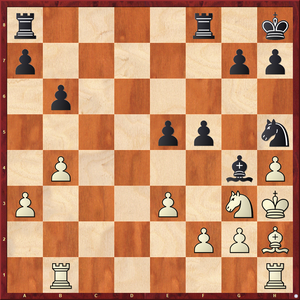It’s one of the most frustrating feelings in chess:
You calculate correctly. You see all the key moves. But you still end up playing a bad one.
It’s not just painful—it’s confusing.
I’ve been there many times. And I see it happen to my students constantly. They don’t blunder. They don’t miss anything obvious.
But they still make the wrong decision.
So what’s going on here?
The Hidden Problem: You’re Asking the Wrong Question
We like to believe our decisions are based on logic. But most of them aren’t. They’re emotional.
I learned this by reading the fascinating book Thinking Fast and Slow by Nobel Prize winner Daniel Kahneman. In the book, Kahneman presents two modes of thought:
- System 1: Fast, emotional, instinctive
- System 2: Logical, slow, more deliberate
We’d love to think that we always use System 2 to control System 1… but his research shows the opposite. The emotional system leads the way, and the logical system then comes up with reasoning to prove what System 1 wants us to believe.
Here is how this happens:
Emotion → Rationalization → Decision that feels logical
The Trap of “Playing for a Win”
Imagine playing against a lower-rated opponent. Your natural tendency is that you want to win, which means avoiding draw-ish lines. So during the game, instead of taking rational decisions, your brain starts answering one simple question:
“How can I avoid a draw?”
I’ve played one of my worst games in my career in this fashion. What happened?
I kept playing absurd moves, just because I discarded all the moves that seemed “drawish” or “equal”. It is not like I missed a specific move or hidden tactic. I just kept convincing myself that rejecting what looked like too equal for my taste was a smart decision.
During the game, trapped by my emotional decision-making, I justified my moves with lines I calculated. Because my emotional brain wanted to win, my rational brain came up with lines supporting this desire.
Here is how this ended:

I’m not alone in this. I bet you’ve had games where you couldn’t understand the reasoning behind your own moves. Well, you got tricked by your brain… and there was not much reason in your decision-making!
Instead, this is what went on in your brain:
❌ Wrong question: “How do I avoid a draw?”
❌ Wrong filter: Discard all lines that look drawish; come up with weird justifications for even stranger moves
❌ Wrong move: Because you excluded everything that resembled a draw
A GM friend of mine once made the most absurd mistake because of this exact process.
He got checked in a serious rapid game and had only two legal moves.
One led to a perpetual.
Short on time and determined to win, he didn’t even look at it—he just played the other one… and got checkmated in 3.
Technically, he was able to avoid the draw… but one might argue at too high a cost.
Ask This Instead: What Leads to the Most Favorable Outcome?
Rather than asking:
- “How do I avoid a draw?”
- “What’s the best move?”
Try this instead:
“Which move leads to the most favorable outcome—for me?”
This one shift brings you back to the real goal.
It grounds your decision in logic, not in rationalized emotion.
Sometimes, the best outcome is a draw. Sometimes, it’s steering into a stable position you can press later. Sometimes, it’s keeping pieces on—but only if it makes sense.
Another question that leads to the same result is:
What does the position require?
This moves you away from your own wishes, dreams and desires and helps you focus on the position at hand.
I Wish Someone Told Me This Earlier…
As an ambitious player, I fell into this trap constantly. I pushed beyond logic, convinced that ambition alone would win games.
My coach at the time—GM Markus Ragger—summed it up perfectly:
“You’re not playing for a win. You’re trying to lose.”
But I didn’t have a better system. So I kept repeating the same mistake.
The Simplified Fix
Because this shift is so powerful, I created a full module about it inside my course, The Simplified Chess Improvement System.
In that module, I show you how to:
- Avoid emotional traps
- Ask better questions
- Build a practical decision-making process you can trust
And true to the system’s name, I keep the solution simple—so you can apply it even under pressure.
👉 If you’re already an SCIS student, this new module is now live.
👉 If you’re not yet a student and want to master your decision-making while following a complete, structured improvement system, check out SCIS here.
Here is to decisions based on logic, not emotions or underlying wrong questions.
Keep improving,
GM Noël Studer
PS: This article was initially sent out to my Newsletter list. If you want to get chess improvement advice for free in your inbox, join 17,000+ chess improvers by signing up for Friday Grandmaster Insights here.
Whenever you’re ready, here is how I can help you:
- Want to know How to train chess well? Check out The Simplified Chess Improvement System. This course taught 800+ students the How of Chess Training. Create your high-quality chess plan and learn how to study each part of Chess, from tactics to openings & endgames. Click here to learn more.
- Rated below 1200 Chess.com? Need to refresh your fundamentals? Check out my course, Beginner Chess Mastery. You’ll learn all the fundamentals, from strategy to how to get the most out of your pieces, tactics, and endgames. You even get a full opening repertoire for free. Click here to learn more.